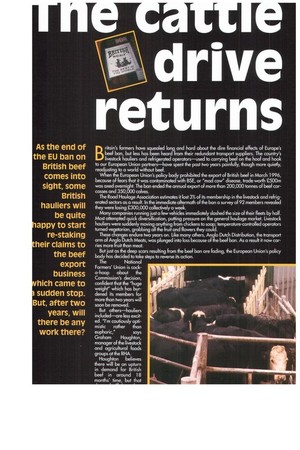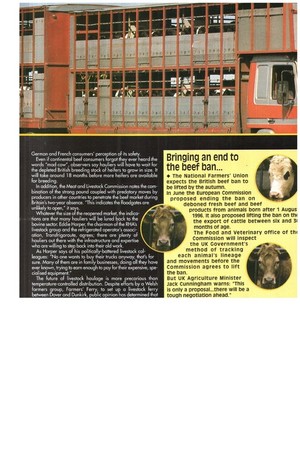I I I Lzri*I411
Page 50

Page 51

If you've noticed an error in this article please click here to report it so we can fix it.
dirve returns
As the end of the EU ban on British beef comes into sight, some British hauliers will be quite appy to start re-staking heir claims to the beef export business hich came to sudden stop. But, after two years, will there be any work there?
Britain's farmers have squealed long and hard about the dire financial effects of Europe's beef ban, but less has been heard from their redundant transport suppliers. The country's livestock hauliers and refrigerated operators—used to carrying beef on the hoof and hook to our European Union partners—have spent the past two years painfully, though more quietly, readjusting to a world without beef.
When the European Union's policy body prohibited the export of British beef in March 1996, because of fears that it was contaminated with BSE, or "mad cow" disease, trade worth 2500m was axed overnight. The ban ended the annual export of more than 200,000 tonnes of beef carcasses and 350,000 calves. The Road Haulage Association estimates it lost 3% of its membership in the livestock and refrigerated sectors as a result. In the immediate aftermath of the ban a survey of 92 members revealed they were losing 2300,000 collectively a week. Many companies running just a few vehicles immediately slashed the size of their fleets by half. Most attempted quick diversification, putting pressure on the general haulage market. Livestock hauliers were suddenly moving anything from chickens to soap; temperature-controlled operators turned vegetarian, grabbing all the fruit and flowers they could. These changes endure two years on. like many others, Anglo Dutch Distribution, the transport arm of Anglo Dutch Meats, was plunged into loss because of the beef ban. As a result it now carries more fruit than meat.
But just as the deep scars resulting from the beef ban are fading, the European Union's policy body has decided to take steps to reverse its action.
The National Farmers' Union is cocka-hoop about the Commission's decision, confident that the "huge weight" which has burdened its members for more than two years will soon be removed.
But others—hauliers included—are less excited. "I'm cautiously optimistic rather than euphoric," says Graham Houghton, manager of the livestock and agricultural foods groups at the RHA.
Houghton believes there will be an upturn in demand for British beef in around 18 months' time, but that German and French consumers' perception of its safely. Even if continental beef consumers forgot they ever heard the words "mad cow", observers say hauliers will have to wait for the depleted British breeding stock of heifers to grow in size It will take around 18 months before more heifers are available for breeding. In addition, the Meat and Livestock Commission notes the combination of the strong pound coupled with predatory moves by producers in other countries to penetrate the beef market during Britain's two-year absence. "This indicates the floodgates are unlikely to open," it says. Whatever the size of the reopened market, the indications are that many hauliers will be lured back to the bovine sector. Eddie Harper, the chairman of the RHAs livestock group and the refrigerated operator's association, Transfrigoroute, agrees; there are plenty of hauliers out there with the infrastructure and expertise who are willing to step back into their old work.
As Harper says of his politically-battered livestock colleagues: "No one wants to buy their trucks anyway, that's for sure. Many of them are in family businesses, doing all they have ever known, trying to earn enough to pay for their expensive, specialised equipment." The future of livestock haulage is more precarious than temperature-controlled distribution. Despite efforts by a Welsh farmers group, Farmers' Ferry, to set up a livestock ferry between Dover and Dunkirk, •ublic o inion has determined that
Bringing an end to the beef ban...
• The National Farmers' Union expects the British beef ban to be lifted by the autumn.
In June the European Commission proposed ending the ban on deboned fresh beef and beef products from animals born after 1 Augus 1996. It also proposed lifting the ban on thi the export of cattle between six and 31 months of age.
The Food and Veterinary office of thi Commission will inspect the UK Government's method of tracking each animal's lineage and movements before the Commission agrees to lift the ban.
But UK Agriculture Minister Jack Cunningham warns: "This is only a proposal...there will be a tough negotiation ahead."
















































































































